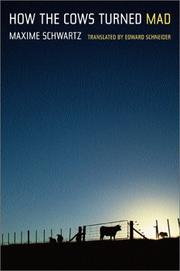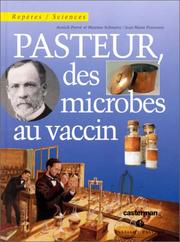| Listing 1 - 10 of 10 |
Sort by
|

ISBN: 128235762X 9786612357626 0520931513 9780520931510 0520243374 9780520243378 6612357622 Year: 2004 Publisher: Berkeley University of California Press
Abstract | Keywords | Export | Availability | Bookmark
 Loading...
Loading...Choose an application
- Reference Manager
- EndNote
- RefWorks (Direct export to RefWorks)
Fear of mad cow disease, a lethal illness transmitted from infected beef to humans, has spread from Europe to the United States and around the world. Originally published to much acclaim in France, this scientific thriller, available in English for the first time and updated with a new chapter on developments in 2001, tells of the hunt for the cause of an enigmatic class of fatal brain infections, of which mad cow disease is the latest incarnation. In gripping, nontechnical prose, Maxime Schwartz details the deadly manifestations of these diseases throughout history, describes the major players and events that led to discoveries about their true nature, and outlines our current state of knowledge. The book concludes by addressing the question we all want answered: should we be afraid? The story begins in the eighteenth century with the identification of a mysterious illness called scrapie that was killing British sheep. It was not until the 1960's that scientists understood that several animal and human diseases, including scrapie, were identical, and together identified them as transmissible spongiform encephalopathy (TSE). The various guises assumed throughout history by TSE include an illness called kuru in a cannibalistic tribe in Papua New Guinea, an infectious disease that killed a group of children who had been treated for growth hormone deficiencies, and mad cow disease. Revealing the fascinating process of scientific discovery that led to our knowledge of TSE, Schwartz relates pivotal events in the history of biology, including the Pasteurian revolution, the birth of genetics, the emergence of molecular biology, and the latest developments in biotechnology. He also explains the Nobel Prize-winning prion hypothesis, which has rewritten the rules of biological heredity and is a key link between the distinctive diseases of TSE. Up-to-date, informative, and thoroughly captivating, How the Cows Turned Mad tells the story of a disease that continues to elude on many levels. Yet science has come far in understanding its origins, incubation, and transmission. This authoritative book is a stunning case history that illuminates the remarkable progression of science.
Bovine spongiform encephalopathy. --- Prion diseases in animals --- History. --- agriculture. --- beef. --- biology. --- brain infection. --- cannibalism. --- carnism. --- carnivore. --- cattle. --- cows. --- disease. --- food and culture. --- food studies. --- food. --- genetics. --- health. --- heredity. --- infectious disease. --- kuru. --- life sciences. --- mad cow. --- mammals. --- meat eating. --- meat. --- medical nonfiction. --- medical science. --- medicine. --- molecular biology. --- neuroscience. --- nonfiction. --- papua new guinea. --- pasteur. --- prion disease. --- prion hypothesis. --- science. --- scrapie. --- sheep. --- transmissible spongiform encephalopathy. --- tse. --- zoology.
Book
Year: 1967 Publisher: Paris Université
Abstract | Keywords | Export | Availability | Bookmark
 Loading...
Loading...Choose an application
- Reference Manager
- EndNote
- RefWorks (Direct export to RefWorks)
Book
ISBN: 9782738131782 2738131786 Year: 2014 Publisher: Paris : Odile Jacob,
Abstract | Keywords | Export | Availability | Bookmark
 Loading...
Loading...Choose an application
- Reference Manager
- EndNote
- RefWorks (Direct export to RefWorks)
Quatrième de couverture : "Pour les Français, Louis Pasteur n est pas seulement celui qui a inventé les vaccins, il est aussi le père de la microbiologie. S ils connaissent le nom de Robert Koch, celui-ci n évoque pour eux que le bacille de la tuberculose. À l inverse, de l autre côté du Rhin, on ne retient de Pasteur que la découverte du vaccin contre la rage, alors que Koch est un héros national, découvreur des bactéries causant les maladies infectieuses les plus meurtrières. Une rivalité féroce a opposé ces deux savants.Nourrie, du côté de Pasteur, par un nationalisme exacerbé résultant de la défaite française lors de la guerre de 1870, et, pour Koch, de sa difficulté à s imposer face à un savant de vingt ans son aîné et bénéficiant d un immense prestige international. Mouvementée et violente, cette opposition, qui s est étendue aux écoles qu ils ont créées, n a pour autant pas été stérile, bien au contraire. Elle a conduit les savants français et allemands à se surpasser, accomplissant des uvres d une étonnante complémentarité. Grâce à eux, la plupart des maladies infectieuses qui décimaient jadis l humanité ont été vaincues."
Medical Laboratory Personnel --- Bacteriology --- Infectious Disease Medicine --- History, 19th Century. --- Microbiologists --- Communicable diseases --- Microbiologistes --- Bactériologie --- Maladies infectieuses --- Biography. --- history. --- Biography --- History --- Biographie --- Biographies --- Histoire --- Pasteur, Louis, --- Koch, Robert, --- History of Medicine --- Infectious Diseases --- Communicable Disease Control --- history --- Bactériologie --- Infectious Diseases - history --- Communicable Disease Control - history
Book
ISBN: 9782738120489 2738120482 Year: 2008 Publisher: Paris: Odile Jacob,
Abstract | Keywords | Export | Availability | Bookmark
 Loading...
Loading...Choose an application
- Reference Manager
- EndNote
- RefWorks (Direct export to RefWorks)
À la fin des années 1970, les microbes semblaient vaincus. De la rage à la tuberculose, aucun n'avait résisté. La variole, la plus meurtrière, était même éradiquée. Et puis, en une vingtaine d'années, tout a basculé. Ebola, sida, vache folle, SRAS, grippe aviaire, les microbes ressurgissent et semblent se jouer des hommes. Ce livre décrit une réalité scientifique qui dépasse la science-fiction : il montre comment les microbes ont appris à résister aux antibiotiques, quelles parades, toutes plus ingénieuses, ils ont su opposer aux moyens thérapeutiques. Et il explique à quelles conditions les hommes pourront l'emporter. Pourvu qu'ils ne prêtent pas main-forte aux microbes en les disséminant dans des attaques terroristes !
Communicable diseases --- Pathogenic microorganisms --- Maladies infectieuses --- Micro-organismes pathogènes --- Biomédecine --- --Maladie infectieuse --- --Biologie --- --Biomédecine --- --Communicable diseases --- Micro-organismes pathogènes --- Communicable diseases. --- --Communicable diseases. --- Maladie infectieuse --- Biologie

ISBN: 0520235312 Year: 2003 Publisher: Berkeley (Calif.) : University of California press,
Abstract | Keywords | Export | Availability | Bookmark
 Loading...
Loading...Choose an application
- Reference Manager
- EndNote
- RefWorks (Direct export to RefWorks)
Book
Abstract | Keywords | Export | Availability | Bookmark
 Loading...
Loading...Choose an application
- Reference Manager
- EndNote
- RefWorks (Direct export to RefWorks)
Biochemists --- Scientists --- Loir, Adrien Charles, --- Loir, Adrien Charles, --- Pasteur, Louis, --- Travel. --- Family.
Book
Year: 2009 Publisher: Paris: Odile Jacob,
Abstract | Keywords | Export | Availability | Bookmark
 Loading...
Loading...Choose an application
- Reference Manager
- EndNote
- RefWorks (Direct export to RefWorks)

ISBN: 2203140410 Year: 1999 Publisher: Bruxelles Casterman
Abstract | Keywords | Export | Availability | Bookmark
 Loading...
Loading...Choose an application
- Reference Manager
- EndNote
- RefWorks (Direct export to RefWorks)
Book
ISBN: 9782732482200 Year: 2017 Publisher: Paris : La Martinière,
Abstract | Keywords | Export | Availability | Bookmark
 Loading...
Loading...Choose an application
- Reference Manager
- EndNote
- RefWorks (Direct export to RefWorks)
Digital

ISBN: 9782759820467 Year: 2017 Publisher: Les Ulis EDP Sciences
Abstract | Keywords | Export | Availability | Bookmark
 Loading...
Loading...Choose an application
- Reference Manager
- EndNote
- RefWorks (Direct export to RefWorks)
| Listing 1 - 10 of 10 |
Sort by
|

 Search
Search Feedback
Feedback About UniCat
About UniCat  Help
Help News
News